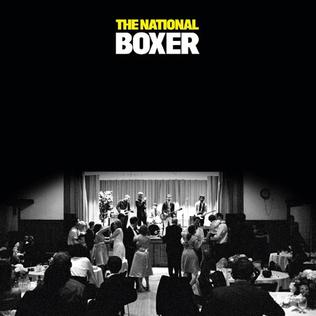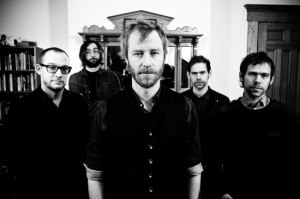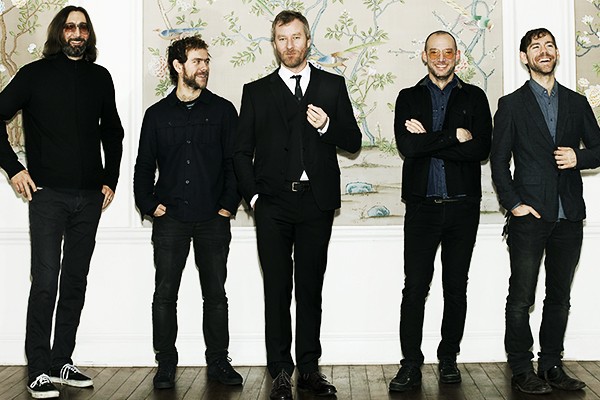As I leaned against the sullied toilet bowel, with my brain awash in guilt and my stomach aching to calm itself, the last song off a twelve-track LP completed its final few revolutions on our dorm room’s record player. I don’t remember much about what acts of debauchery preceded this specific moment in time, but I will try to paint you a picture nonetheless.

It was early 2008. Probably January. I was beginning my second quarter as a sophomore at Ohio University (no, not the Buckeyes. The Bobcats). Some of my best mates and I had been drinking – and had been drinking quite a lot. The night began low-key enough. We went to a Mexican restaurant for a friend’s birthday where I partook in way too many margaritas drenched with way too much tequila. I had only been drinking socially a little over six months at the time and I rarely binged, so I still had this odd sense of alcoholic invincibility. How naïve of me, I know.
The evening progressed. Where we headed after the Mexican restaurant, I have no idea. Eventually I ended up here, next to this toilet. Puking my guts out around two in the morning. My friends, huddled just beyond the door, conversing and carousing in the main room. And as I clung to the toilet with all my strength, my friend Brian listened to my simple request – he put on Boxer by The National. For the better part of the next hour, I would continue puking every ten minutes or so – regretting that extra shot of bottom-shelf vodka, that extra can of PBR, and every sip of those damned margaritas – but through it all, that twelve-track LP continued to spin. It was on this night I truly heard Bryan Devendorf’s unique drumming, Scott Devendorf’s understated bass lines, the Dessner (Aaron and Bryce) brothers’ incredibly playful finger-picking and, especially, Matt Berninger’s crooning, soulful lyrics. It was on this night I truly heard The National.
 Since that night, I have seen The National perform on four separate occasions (two of those times I shared alcohol, I illegally snuck in with the lead singer’s mother, Mrs. Berninger. She’s a fun lady – but, alas, apparently taken). I own all of their albums on vinyl (yes, even their self-titled debut). I have a couple t-shirts of theirs. I frequent their online web forum. I have all their rarities (even the Game Of Thrones cover, their duet with St. Vincent, and the (oddly coveted) Tarquin Roughs, which, no – I won’t share with you. The band asked me not to). I have framed artwork (that’s a combination of fan art and my own DIY design) hung up above my bed. I even re-purchased all their albums and gave them to my father as a Christmas present with a binder that possessed pages full of each song’s lyrics (which, by the way, I’m pretty certain he probably never opened. I’m okay with it). Hell, their soon-to-be-released album, Trouble Will Find Me, has already leaked – but I won’t allow myself to imbibe until May 21st, the date the band actually wants me to listen. In short, I’m a super weirdo fan who should probably be kept at a safer distance from the band than I’ve previously been allowed because my love for them borders on über-obsession.
Since that night, I have seen The National perform on four separate occasions (two of those times I shared alcohol, I illegally snuck in with the lead singer’s mother, Mrs. Berninger. She’s a fun lady – but, alas, apparently taken). I own all of their albums on vinyl (yes, even their self-titled debut). I have a couple t-shirts of theirs. I frequent their online web forum. I have all their rarities (even the Game Of Thrones cover, their duet with St. Vincent, and the (oddly coveted) Tarquin Roughs, which, no – I won’t share with you. The band asked me not to). I have framed artwork (that’s a combination of fan art and my own DIY design) hung up above my bed. I even re-purchased all their albums and gave them to my father as a Christmas present with a binder that possessed pages full of each song’s lyrics (which, by the way, I’m pretty certain he probably never opened. I’m okay with it). Hell, their soon-to-be-released album, Trouble Will Find Me, has already leaked – but I won’t allow myself to imbibe until May 21st, the date the band actually wants me to listen. In short, I’m a super weirdo fan who should probably be kept at a safer distance from the band than I’ve previously been allowed because my love for them borders on über-obsession.
Now that I’ve aired all my dirty laundry, I can get to the point – The National, to me, are not just a band. Their catalogue of songs are my verses. They are my psalms. They are my Gospel.
When I first truly heard the album that one fateful night, I didn’t immediately get it. I didn’t immediately understand what I was listening to. But the seed was firmly planted and the more I listened to their multiple works, the more I was unable to be satiated. They had accumulated four whole albums worth of material up to this point and I had just heard about them for the first time only a few months ago. Every time I had previously attempted to weather through the two albums of theirs that I had in my possession – Alligator and Boxer – I never made it. I always had to stop. I would say I didn’t like Matt’s voice, I would say the sound just wasn’t my style, but none of these reasons were true. The truth was that I thought their music was too depressing. And too relatable. And too… honest. And honesty was something I didn’t want to deal with at the time. Not in the least.
After that fateful night, however, I discovered something profound – I had discovered a refuge. I had found a sounding board for some of my most real fears, my most real quandaries, my most deep-seated secrets.
And so the entirety of The National’s catalogue immediately leapt its way onto my iPod. Alligator and Boxer took the majority of my attention, while a couple tracks from Sad Songs for Dirty Lovers made their way into the rotation. I still have difficulty completely adoring their self-titled, The National, and back in 2008 it was no different, but I would occasionally dip my toe into that album’s waters when the moment struck me (and still do). This coupled with their oft-cited “progression-altering” Cherry Tree EP (their first work to be fully produced by Peter Katis), soon-to-be-released Virginia EP, and scores of other singles and b-sides became the soundtrack to that winter and spring of 2008. These songs began an intellectual, emotional journey that would completely change my life.
I’m a writer, but not a “music” writer – I have a rather narrow interest in music; rap, hip-hop, punk, country… I claim complete and utter ignorance when it comes to anything concerning those genres – but the moment I began to scour through the five dozen or so completed tracks by The National? I gulped, devoured, slurped down the ruminations from lyricist Matt Berninger like a word-starved lunatic.
It wasn’t just the words Matt was singing, nor the phrases. It was the evolution of the band’s story – the deliberate, thoughtful process through which Matt decided what lyrics to match with which songs. And, just as importantly, the order of tracks on each album and the interconnected lyrical symbols, thematic motifs, and even character names that re-appear throughout their storied discography which shape their catalogue in a way that’s very specifically ‘The National’. Matt’s lyric-inventing process, while only vaguely touched upon in their first documentary A Skin, A Night, is clearly a sleep-deprivation inducing endeavor for Mr. Berninger. Their albums are all the better for it..
What mostly tugs at one’s heartstrings when listening to The National is how earnest, honest, and generous Matt’s characters (or the separate members of Matt’s psyche, however you prefer to think about them) tend to be – even if they are, ultimately, a little spacy, deviant, and perverted as well. They’re eternally worried about the safety, health, and love lives of their own personal loved ones – and equally concerned that their own private wants and desires might be their ultimate undoing or, worse, their loved ones’..
“Green Gloves” is a perfect example of the former, a song entirely about wishing the best night upon your friends who can’t be near you, and hoping to one day know everything about the new friends (and lovers) your friends meet while you’re not together; “Blank Slate”, on the flip side, is a perfect example of the latter. Matt suggests during this track that he “tackle young girls off their beautiful bikes” or “jump out of a cake with a hard-on and sing” (and, nope, not kidding about either of those).
Having grown up Catholic, one of the strangest and most comforting of reiterated symbols throughout their work is that of angels. Neither good nor bad, angels are merely minor deities who go about their duties – leading men to their afterlives in “Mistaken For Strangers”, never letting the famous ones come through “England”, and shedding their feathers woefully in “Gospel”. Religion, and specifically Christian based religious figures and ideals, are nothing more than mere myth when brought into the National’s lyrical fold – they’re just another minor figure in the modern American society we’re all a part of. Even more outlandish, the angels in The National’s lyrics seem to constantly regret being affiliated with their own respective denominations, opting to “stay the night with the sinners” because they’re “afraid of the house” of the lord, which is too “desperate to entertain”. And angels are even less interested in the human race than we perceive them, according to Matt’s point of view: “You wouldn’t want an angel watching over you? Surprise, surprise, they wouldn’t wanna watch another uninnocent, elegant fall into the unmagnificent lives of adults”.
In other words, as a scared teenager turning into an adult – having been raised with the fear of the Lord and what awaited me in hell for any ill transgressions – it was incredibly comforting to listen to a band not only dismiss the notion of Christian religion as not-eternally-damning, but relegate their symbols and sanctuaries as nothing more than mere caricatures of Americanized moral authority.
And that’s precisely why I clung to Matt Berninger and this rag tag crew of musicians. See, I was in a funk myself during this time in college – I had been attending Catholic, private schools for twelve years prior to attending Ohio University, which is quite the liberal, public institution. I was stuck up, pretentious, one of those kids who doesn’t condemn individuals for drinking and smoking, but certainly puts their nose up at others who partake in such activities (thinking back, it’s a wonder now that I made any friends during my early years at Ohio University at all).
When I finally did make friends, however, I began to realize that their lives weren’t lead by an invisible deity who bestowed an afterlife of damnation upon them for certain slights – most of the people who I clung to didn’t prescribe to any religious creed at all (and, if they did, they’d grown out of it during their first years at OU). Still, the group of friends I had surrounded myself with all possessed a deep-seated moral code. We all cared about each other – our hopes, our fears, our futures… we all wanted the best for one another. I was convinced up and until I attended Ohio University that people who participated in “morally unsound” acts were “morally unsound” people. But what was morally unsound? What was unfair? What was unkind?
Ultimately, The National taught me how to be a nice, fair, kind person – mythical, invisible deity present or not. No matter what the characters in any song we’re going through, none of them ever succeeded by being premeditatedly evil or rotten. Sure, there are the occasional songs where Matt’s personal neuroses accuse Matt of being all of those things (“Conversation 16” and “Karen” come to mind), but Matt always reins his own malignance in before he would ever truly act on it. The mind may wander, but Matt’s characters – The National’s characters – never act on these malicious musings. They keep their vain and uncomfortable thoughts in their heads – in their “buzzing, three-star hotel(s)” (“Blank Slate”), in their “dollhouses” (“All The Wine”) – and they seem to be much better off for it. And, no matter what, if they are unsure how to act or behave in any given situation, there’s a simple, all-encompassing solution that practically sums up the entirety of The National’s catalogue in one single line from “Baby, We’ll Be Fine”:
“All we gotta do is be brave and be kind”.
As Boxer came to an end during that awe-inspiring, puke-filled evening in January 2008, my friends Becca and Brian came into the bathroom to make sure I was still okay. Neither were religious, neither were doing this deed to be a Good Samaritan; they were simply checking on me out of the kindness of their hearts. And I was okay. I was going to survive, margaritas be damned.
However, I did have one tiny request for them… “Play ‘Gospel’ again”. The two chuckled, probably thought it was a joke at first. But as they entered back into the main room, I heard the muffled vocals of Matt Berninger lightly counting off ‘1, 2, 3, 4’ just as the lilting piano chords and faint acoustic guitar began. And I listened, quite contemplatively. The final song on Boxer is called “Gospel” and is, even though vaguely, about one simple subject – love is war. It’s as simple as that.
If we want to stay in touch and be there for the ones we care about, we have to fight through great distances, media oversaturation, and sloppy social networking. We have to be willing to be there for our comrades, care for them in their times of need, and mourn with them when they are mourning. We have to learn to stick together, to let others into our hearts – and to do it without fear of punishment or reward – if we want our time on this Earth to mean a single damn thing.
As the final lyrics floated by that fateful night, I began to stir. I moved into my dorm room and tucked myself into bed. I took the blankets and laid them over my weakened, frail, post-puke body – thinking of nothing other than the friends I had made over the years, the friends I had lost, the friends that I hoped would stick around forever, and all the friends I had yet to even meet.
.“My angel face is falling / Feathers are falling on my feet
My angel face is falling / Feathers are falling on my feet
Darling can you tie my string? / Killers are calling on me
Darling can you tie my string? / Killers are calling on me”
The National’s songs are my verses. They are my psalms. They are my Gospel. I can’t wait to listen to Trouble Will Find Me for the first time… on May 21st, of course.
— Conor Patrick Hogan
For more of my mish-mashed musings (in real time, no less!) follow me on Twitter: @CPatrickDood


